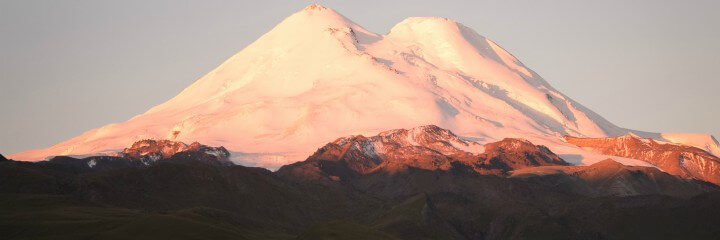“Trusted tips from an experienced mountain guide”
So, you have heard the call of the mountains and want to climb Mount Elbrus? The allure of this mountain, standing at 5642 meters (18,510 feet), draws thousands every year, seeking to ascend to its snowy heights. It is the highest mountain in Europe, making it one of the famed “7 Summits” (the name used to refer to the highest mountain on each of the 7 continents). Whether you are still considering this climb or are committed to your adventure, here are a few things you should know before you hop on a plane to Russia.
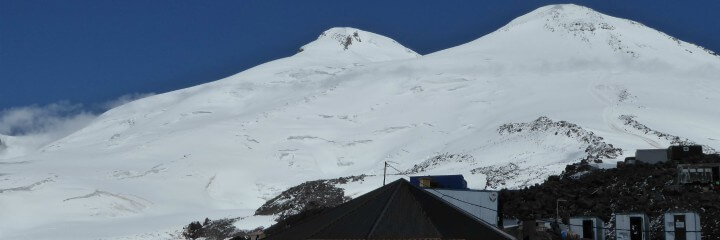
1) WHERE IS MT. ELBRUS EXACTLY?
Don’t worry—many people don’t know. Mt. Elbrus is in Southern Russia! It is the crown jewel of the North Caucasus Mountains which form Russia’s southernmost border between the Black and Caspian seas. The Caucasus Mountain Range is also a part of Armenia, Georgia, and Azerbaijan (the South Caucasus), but Elbrus is in the Russian portion of the Caucasus. If you watched the Winter Olympics in Sochi in 2014 (or the Portugal/Spain match in the 2018 World Cup), Elbrus is not too far from Sochi and a part of the same beautiful mountain rage. Click here to see Mt. Elbrus on a map.
Although many people outside of Russia aren’t very familiar with Mt. Elbrus, of course within the country and region it is very well-known. Famous 19th century Russian poets Evgeny Pushkin and Mikhail Lermontov wrote extensively about the Caucasus Mountains, including this translated poem by Lermontov:
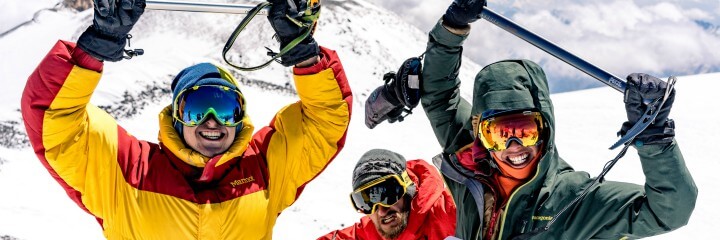
2) HOW SERIOUS A CLIMB IS MT. ELBRUS?
Elbrus is a serious mountain. It is covered in glaciers and its summit is shrouded in ice and snow year-round. Climbing Elbrus is considered “technical mountaineering” with even the easiest route requiring the use of technical climbing equipment such as rope, harness, crampons and ice axe. Objective hazards include steep icy slopes, glacier navigation, mountain weather (cold, wind, unexpected storms) and high altitude. Of course climbing anything up to the altitude of 18,500+ feet is unnatural for the human body and will provide different challenges. Some would call climbing a mountain like Elbrus Type 2 fun.
To the first-time mountaineer Elbrus may be an extremely difficult challenge while most experienced climbers find the standard route quite easy. Many climbers attempting to conquer the 7 Summits start with Mt. Kilmanjaro in Africa and move on to Mt. Elbrus as their 2nd peak, so in that sense, it’s not as difficult as most of the other 7 summits. How difficult climbing the mountain will feel will vary greatly from person to person and depends a lot on experience and physical fitness. Exposure to other types of endurance sports certainly helps prepare for the mental and physical challenge of the climb. Training for the mountain is of course very important. Imagine the summit day as something like climbing and then descending 400 flights of stairs with much less oxygen in the air than you are likely used to! A person who has taken the time to train well will notice the benefit.
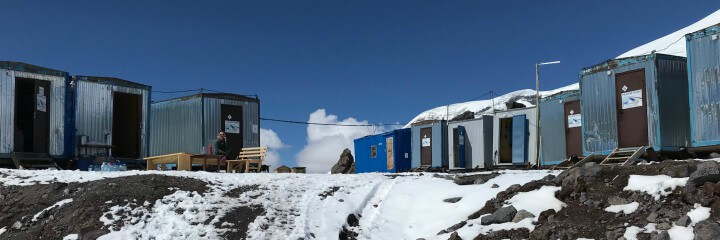
3) WHAT IS THE ACTUAL PLAN FOR THE CLIMB?
An average itinerary will look something like this:
Day 1: You’ll fly into one of the local airports and make the 3+ hour drive to Elbrus’s base. Acclimatization is already starting on this day as the drive to Elbrus takes you up to 8,000 feet above sea level.
Days 2: Days 2-5 are all about acclimatization. Day 2, you’ll do an acclimatization hike up one of Elbrus’s neighboring mountains.
Day 3: You will move up to base camp on the south side of Elbrus at one of the “barrel hut” shelters (which you must reserve in advance). These come equipped with kitchens and gas stoves for cooking which are a real plus.
Day 4: Enjoy another acclimatization hike, generally up to the Pastukhov Rocks.
Day 5: Typically, you a rest day, with some technical training involved.
Day 6: Summit day! You will get up early (usually around 1 am or 2 am) and start for the summit. You’ll have the option to hire a snowcat (tractor/tank) to take you up as high as Pastukhov Rocks which makes the summit bid considerably easier. Most parties expect to reach the summit before noon and to return to base camp by 3:00 or 4:00 pm in the afternoon.
Day 7: Usually this day is held as a reserve summit day in case of poor weather on Day 6. If you successfully summit Elbrus on Day 6, you can take Day 7 to explore the local area: hiking, horseback riding, or enjoy the Russian banya/sauna.
Day 8: You will head home. Depending on your schedule you can either head to the airport and begin your journey home, or explore more of the North Caucasus/Russia.
This tentative schedule can be stretched depending on the desires and limitations of the party, but typically 8 days is the minimum amount of time most groups give to summiting this formidable mountain. Acclimatization is an incredibly important part of a successful Elbrus Climb. Therefore, we do not recommend attempting to “squeeze” an Elbrus climb into less than 8 days.
4) YOU WILL NEED A VISA AND LETTER OF INVITATION
In order to enter Russia, most foreigners need visas and official invitation letters from an inviting party in-country. Check on your country’s Russian embassy site for exact details on visa requirements to Russia for you. Most countries have visa-processing companies that can help you procure a Russian visa and letter of invitation. However, keep in mind that this process normally takes a month — so make sure you think ahead and allow yourself enough time!
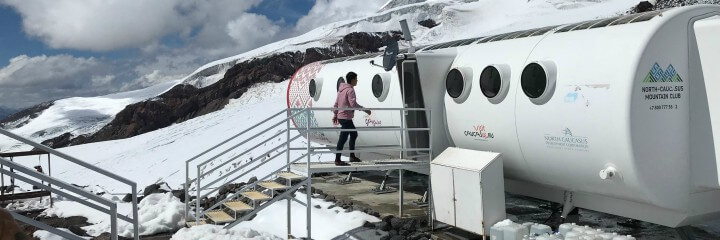
5) SHOULD I HIRE A GUIDE?
While a guide is not required to climb the mountain, we think it is really worth the cost. Guide companies will organize your entire trip— providing transportation to and from the mountain to a regional airport, lodging on and off the mountain, gear rental, meals, etc. In addition to all the logistics is their professional training and wealth of experience which can really help your chances of successfully submitting the mountain.
6) HOW HARD IS ORGANIZING A CLIMB WITHOUT A GUIDE?
How’s your Russian? While in Southern Russia you may come across a handful of people who speak English, however, they are few and far in between. Taxi drivers and public transport workers very rarely speak English, so some degree of Russian proficiency is all but a must when traveling around. On top of this, English is rarely found on road signs so doing it yourself can be tricky.
Most lodging can be reserved online, so this is not too difficult, BUT organizing lodging at the basecamp “barrel huts” often requires a phone call (in Russian) to reserve your time on the mountain. You will find that grocery stores (particularly in the villages around Elbrus) have very limited food selection, and staples to which you are accustomed may simply not be available. You may have to get creative and innovate with your meal planning. IF you are doing all your meal planning yourself, you would be much better off purchasing your food in a local hub city such as Pyatigorsk or Nalchik.
Fortunately, gear rental is fairly straight forward with a number of different rental shops at the base of the mountain offering a wide selection of options at affordable prices. You can rent almost everything you need, from snow pants to even head lamps. This is nice for keeping your airline baggage weight low and also avoiding the need to invest in expensive technical gear you may only use once. One more important thing that’s easy to miss, is to register with the local rescue service МЧС (M-Che-S) before your climb. There is a small registration fee and you will need to tell them the details of your intended climb.
Of course, you should only climb without a guide if you already have significant mountaineering experience. As mentioned above, Elbrus is a serious mountain deserving of respect. If you have the requisite experience and are up for a challenge, however, it is possible to climb the mountain without a guide.
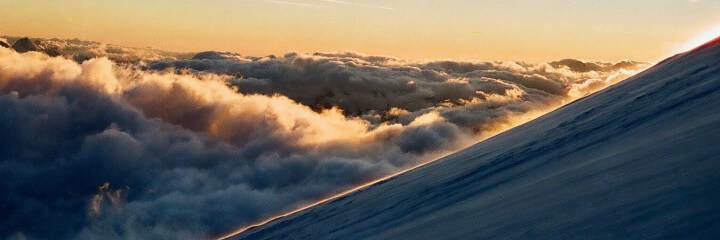
7) ANYTHING ELSE I SHOULD KNOW?
There is much more but this is a good start! One other thing to consider is that the local culture may be quite different than what you are used to at home. Elbrus is located in a primarily Muslim region with a fairly conservative culture. Do some research on the wonderful Balkar and Kabardian peoples that live around Elbrus and come ready to respect their culture as a guest in their ancient lands!
If you would like help climbing Elbrus, already have a group gathered to climb, or would like to join a group, please reach out to us at [email protected] or check out our climbing packages here.
Here are some audio resources that should help you learn more about Mt. Elbrus as well as hear from some other climbers and their experiences summiting it:
Podcast – About Mt. Elbrus itself
Podcast – Fun facts and history about Elbrus
Podcast – Interview with American mountaineer Milo about his summit (author of this article)
Podcast – Interview with local Balkar guide, Takhir
Podcast – Interview with American climbers Kevin & Justin, post-Elbrus summit
Video and commentary of Mt. Elbrus climb, Summer 2018
“Article Author: Camilo Gomez is 26 and an experienced American mountain guide, ski instructor, and rock climber from Colorado. He lived in the Mt. Elbrus region in 2017-2018, and summited Mt. Elbrus successfully two times with a local guide and group of friends.”

